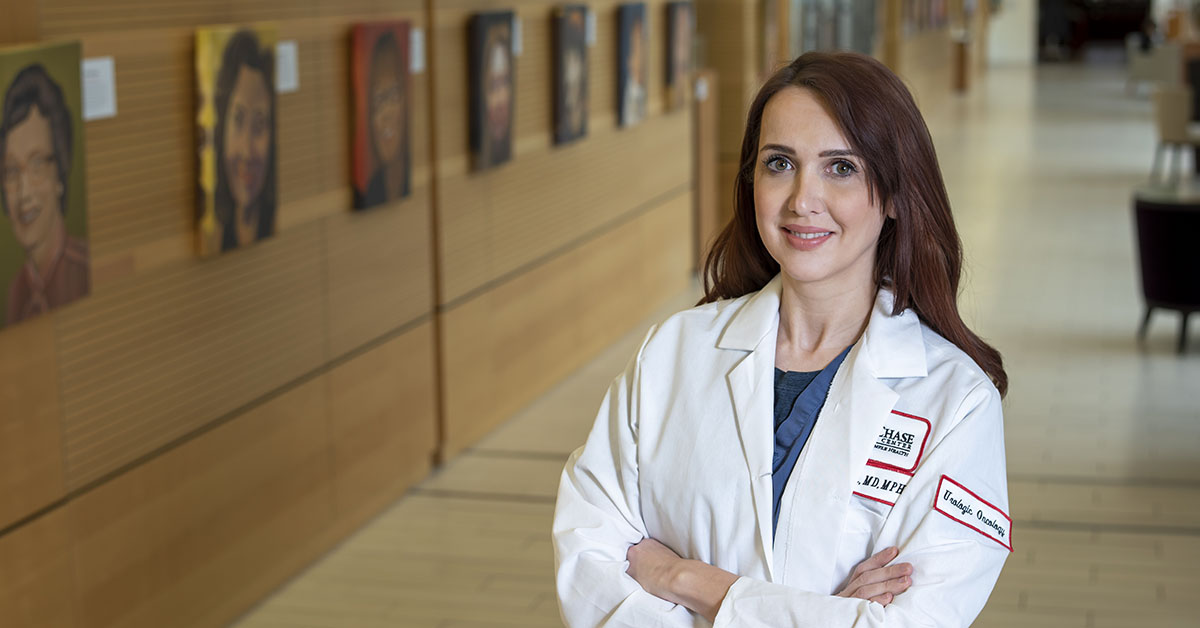
PHILADELPHIA (April 4, 2022)— During the American Association for Cancer Research (AACR) Annual Meeting 2022 on April 8-13, 2022, researchers from the lab of Philip Abbosh, MD, PhD, an assistant professor in the Molecular Therapeutics research program at Fox Chase Cancer Center, will present findings from recent studies.
In one presentation, Laura Bukavina, MD, MPH, a Urologic Oncology Fellow at Fox Chase and lead author, will be presenting findings from a recent study on the gut microbiome that included researchers at both Fox Chase and Case Western Reserve University School of Medicine/University Hospitals Cleveland Medical Center.
“Ninety percent of your immune system is within your gut. And we see that some patients have an incredible response to chemotherapy, while others do not, despite their tumor biology being very similar. This may in part be explained by the gut immune system and gut microbiome,” Bukavina said. “Microbiome” refers to the collection of all microbes and genomes in a community within the body, such as the gut.
“It is incredible to think that as humans, only about one percent of our genomic composition is human, while the rest is derived from the microbiome. We suspected that the microbiome was different in patients with and without cancer, and this study supports that hypothesis,” said Bukavina, who was recently awarded the American Society of Clinical Oncology Genitourinary Conquer Cancer Merit Award for the research.
The research team hypothesizes that the microbiome in the gut primes the immune system to respond differently to both the cancer cells and chemotherapy and wants to explore whether certain bioactive small molecules produced by the microbiome can affect chemotherapy response. They plan to explore this hypothesis now based on Bukavina’s findings.
The end goal of the project is to first identify and then influence specific microbes or metabolites—byproducts of the metabolic process—that improve the response of bladder cancer patients to chemotherapy and immunotherapy. The research Bukavina will present at the symposium is the first step toward this goal.
In another presentation at the meeting, Rashida Ginwala, PhD, a postdoctoral fellow in the Abbosh lab, will present her research on the changes that occur in the microbiome during bladder carcinogenesis—the development of bladder cancer.
Ginwala said she explores this question through the most common type of bladder cancer mouse model using a cancer-causing chemical called BBN. “BBN is one of the tobacco metabolites responsible for the carcinogenicity that we see in human bladder cancer. The idea is if you give mice BBN in their drinking water, they will develop bladder cancer over a period of time,” she said. “We wanted to see whether exposure to this carcinogen is changing the gut microbiome of the mouse as it develops bladder cancer.”
Ginwala’s study showed that certain microbes are more predominant in the mice that were given BBN versus the mice that weren’t. Additionally, researchers found that gut microbial diversity was markedly reduced in female mice given BBN, while the diversity of the male mouse microbiome remained unchanged.
Ginwala said the incidence of bladder cancer is three times higher in men than in women. “To find that even at the level of the gut microbiome you can see these gender differences, it might explain why we see these differences in the incidences of bladder cancer between men and women.”
Two studies by Alexander Metz, a technician in Abbosh’s lab, will also be presented, as well as studies by Henkel Valentine, PhD, and Uttam Satyal, PhD, who are both postdoctoral researchers.
- One of Metz’s studies characterizes the biological changes that result from the loss of the gene Polybromo 1 (PBRM1) and explains how these changes might modulate the immune response to cancer. Metz said the study results shed light on changes in biology and immunogenicity associated with or caused by PBRM1 loss. They also implicate NF-kB, a major gene transcription factor, as a potential moderator of immune response. Further study could help characterize its effects on immune checkpoint blockade therapy.
- In a study by Valentine, researchers developed a customizable bladder cancer mouse model using CRISPR, a gene editing technology. They are developing the mouse model to develop a therapeutic rationale for the application of new drugs to patients with specific tumor genotypes. This system is a plausible way to uncover novel therapeutic vulnerabilities that probably exist in bladder cancer.
- In Satyal’s study, researchers investigated the use of second-generation imidazolium compounds as therapy for non-muscle invasive bladder cancer. Satyal said the need for intravesical therapy—treatment placed directly into the bladder—is crucial for management of high-risk, non-muscle invasive bladder cancer to avoid removal of the bladder. Through this study, researchers found that second-generation imidazolium compounds are toxic to tumors but not normal bladder tissue and have developed a series of compounds based on cancer-selective chemical structures.